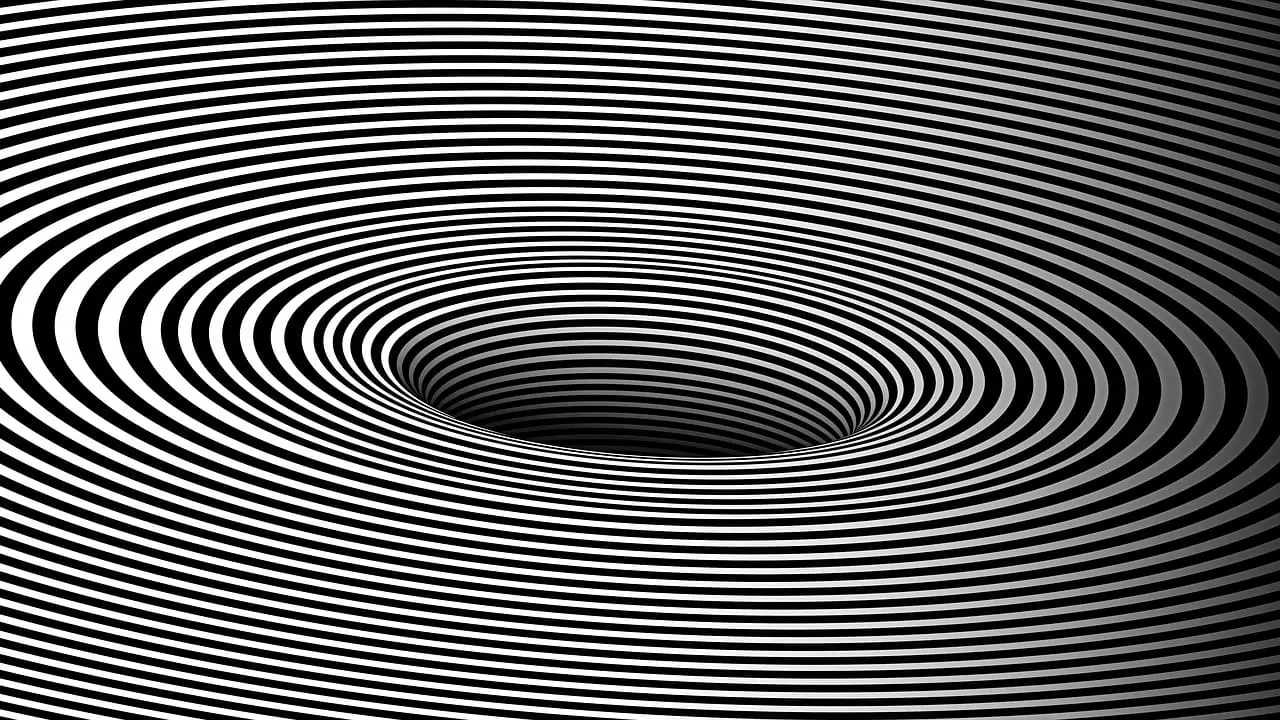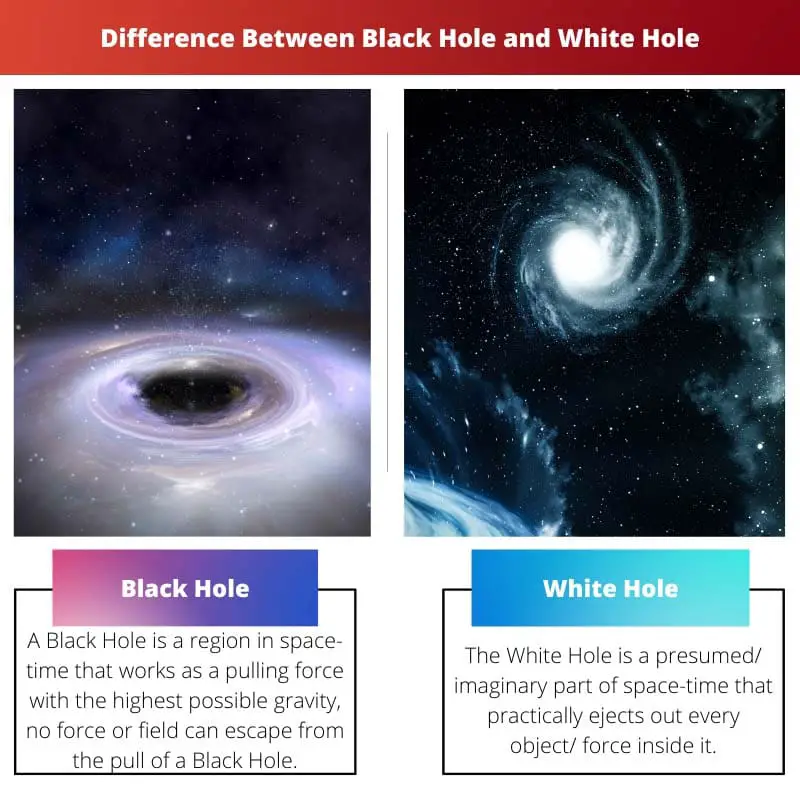Universe- the subject full of mystery and enigma. Down the years through centuries, many baffling questions arise about the components of the universe. One such perplexing topic is the Black Hole and White Hole.
Knowing the complex and convoluted details of Black Hole and White Hole may be tricky as they may appear to be strikingly similar but in reality, are fundamentally different.
Key Takeaways
- Black holes have an immense gravitational pull that prevents even light from escaping, while white holes theoretically expel matter and energy.
- Black holes form from the collapse of massive stars, whereas the formation of white holes remains purely theoretical.
- White holes represent a time-reversed version of black holes, suggesting they could be connected through quantum mechanics, but this has not been proven.
Black Hole vs White Hole
A black hole is a region of space-time where gravity is so strong that nothing, not even light, can escape from it. While black holes are known for absorbing matter and energy, white holes, which are not known to exist, are objects that emit matter and energy without allowing anything to enter.

A Black Hole is a part of space with super-strong gravity and it can be entered only from the outside through which information and light cannot escape.
A black hole is considered a ‘Perfect Black Body’ as no reflection of light occurs through it. A Black Hole has mass but no angular momentum and electric charge.
On the other hand, a White Hole is interpreted as an element of spacetime (theoretical) and is referred to as the antithesis of a Black Hole as it ejects out the matter in contrast to a Black Hole.
However, to date, there is no practical proof as to whether White Hole exists or not since it is a theoretical concept that originated in the 1970s due to Stephen Hawking and other renowned scientists’ research and realization.
Comparison Table
| Parameters of Comparison | Black Hole | White Hole |
|---|---|---|
| Ability to Escape | Nothing can escape from it | Anything can easily escape out of it |
| Entry/ Access | Pulls everything outside towards itself | No entry/ pull from the outside |
| Feature | Pulling Space-Time | Ejecting out Space-Time |
| Concept/ Phenomenon | Real | Hypothetical |
| Origin | John Michell- 1784 | Igor Novikov- 1964 |
What is a Black Hole?
Aforementioned, a Black Hole is a region in space-time that works as a pulling force with the highest possible gravity, no force or field can escape from the pull of a Black Hole.
A black Hole is practically is formed when heavy objects like stars collapse gravitationally, but theoretically, a Black Hole can be formed in many other ways.
In layman’s terms, a Black Hole is a region in space where space matter is squeezed into a tiny spot by the collapse of a star thus granting huge gravity and pull that even light cannot escape from, thus justifying its name.
As no light passes or comes out of a Black Hole nobody can witness a Black Hole. A Black Hole can only be seen with a space telescope that too with special/ additional tools.
The size of a Black Hole may range from small to big. Researches show that there exists a Black Hole with a size of a single atom. No matter what the size of a Black Hole may be the mass inside a Black Hole is as big as a huge mountain.
As Black Hole is not visible scientists found out about the effect of a Black Hole by observing the gas and stars around them as they behave differently around a Black Hole.
A Black Hole when close to a star emits high-energy light which cannot be seen hence space telescopes aid scientists in observing and researching them.
No matter how powerful a Black Hole may appear, it still cannot destroy the earth in any possible way as it is not close to the solar system.
\Even if any Black Hole carries the mass of the sun, it cannot destroy or consume Earth, in such a scenario Earth and other planets will revolve around the Black Hole.

What is a White Hole?
As mentioned above, the White Hole is a presumed/ imaginary part of space-time that practically ejects out every object/ force inside it. It is referred to by the scientists as ‘The Reverse of Black Hole’.
It is a hypothetical concept because there is no concrete theory as to how a White Hole is formed or do they even exist as there is no practical evidence.
The theory of the White Hole arose due to Einstein’s theory of gravity and relativity. This theory also questioned the existence of Worm Holes.
Back in the 1970s, Stephen Hawking realized that some Black Holes do leak, thus the concept of White Holes came into existence.
Theoretically, White Holes are formed through Black Holes, when quantum effects occurring around the Black Hole with further collapsing eventually expels out the matter thus forming a White Hole.
This is the reason a White Hole is defined as the ‘Time-Reversal of a Black Hole’.
The event horizon of a White Hole is of no admission which means that no spacecraft can practically/ sensibly get to the end of a White Hole. A White Hole can affect the entire universe as it ejects out everything and is a one-way hole.
The unique feature of a White Hole is that nothing outside the White Hole can influence anything inside it as it allows zero entry/ admission.
In recent years, the focus on White Hole is increasing, but the only issue is that the origin of White Hole is a question.
Nevertheless, even if White Holes existed, they won’t be stable for too long and they will eventually collapse into a Black Hole.

Main Differences Between Black Hole and White Hole
- A Black Hole has enough shreds of evidence to prove that it is a real phenomenon, whereas a White Hole is considered to be a hypothetical concept.
- Through a Black Hole, even light cannot escape, in contrast, a White Hole allows information, light, energy-matter to escape through it.
- Black Holes have a strong ability to pull due to powerful gravitational forces, on the other hand, White Holes can expel out whatever is inside them.
- A Black Hole is heavily affected by its surrounding as it absorbs everything whereas White Hole is not at all affected by the surroundings.
- Black Hole possesses an event horizon- a boundary with no escape, while the event horizon of White Hole is a boundary of no admission.

